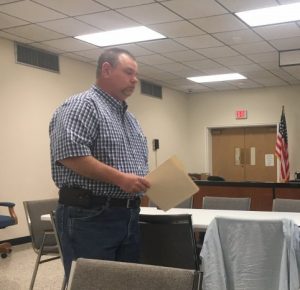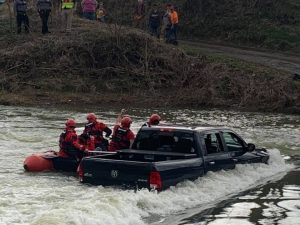March 16, 2021
By: Dwayne Page
DeKalb County to the rescue!
An increase in DeKalb County swift water rescues in recent years, including two just last month, has prompted the Smithville-DeKalb County Rescue Squad to seek additional funds from the county in forming a Swift Water Rescue Task Force.
The task force, to be led by the Rescue Squad, would also include volunteers from the DeKalb County, Smithville and Alexandria Volunteer Fire Departments and possibly local law enforcement officers and others who would be specially trained and equipped for swift water rescues.
During a meeting of the County Commission’s Health, Education & Public Welfare Committee Monday night, Rescue Squad Captain Dustin Johnson asked that the committee recommend to the county commission a funding allocation of $18,000 to equip and train 15 people for this task force and that action be taken as soon as possible so as not to miss area training opportunities for this year. The committee voted 6-0 to send the request on to the full county commission for funding. Those voting in favor were Myron Rhody, Anita Puckett, Jenny Trapp, Julie Young, Matt Adcock, and Beth Pafford.
Although the Rescue Squad, made up of volunteers, is a non-profit organization and not an entity of county government, it receives an annual contribution from the county of $26,000 for its services which includes searching for drowning victims, cave/rope rescues and searches for missing persons, etc. But in most cases, neither the rescue squad members nor volunteer firefighters and other emergency first responders locally are specially trained in water rescues. This additional $18,000 contribution from the county to the rescue squad would be earmarked just for this special training and equipment.
Johnson said he got the idea of forming a local task force after last month’s water rescue at Liberty where five people including a 16 month old child were trapped in their pickup truck amid rushing creek water. Although help came from several different sources, Johnson took special notice of the joint effort and teamwork between the Lebanon and Wilson County forces.
“One of the agencies we called was WEMA (Wilson County Emergency Management Agency) and when they showed up Lebanon was with them. Lebanon and WEMA go in together as a team. I thought that is not a bad idea so I reached out to County Fire Chief Donny Green, Smithville Fire Chief Charlie Parker, and the Alexandria Fire Department to maybe allow some of their members to come and take this training with us because I don’t know if the Rescue Squad will have the personnel to do this but this is something I would like to get started here,” said Captain Johnson.
DeKalb County Emergency Management Agency Director and Smithville Fire Chief Charlie Parker said the task force is needed because flooding, especially flash flooding has happened, and can happen almost anywhere.
“We have already encountered this in the city including in front of Walmart, at Fall Creek, and other places. Although we (Smithville Fire Department) are in the fire business we are also in the rescue business and we sometimes have car wrecks in the edge of the water that we have to get to but you just can’t jump into this (water rescue operation) a little bit. You must have the equipment before the training. We want to combine our resources and do this altogether. I don’t have enough guys (firefighters) to do an effective swift water rescue. It’s the same with Dusty (Rescue Squad). Like me he may not have enough trained people. I know it’s the same way with Donny (County Fire Department). It’s hard enough to get people on fire calls sometimes. That was our thought of putting everybody (departments) together to do this and that is the reason we are all coming to you (county) asking for money because we need a pocket for it (funding) to come from to where we can get these people trained so we can get at least 15 and more later,” said Chief Parker.
Donny Green, DeKalb County Fire Chief, said a trained and equipped water rescue task force would help save lives by being ready at a moment’s notice to spring into action when needed and it would make more sense to have team working together than for each department trying to go it alone.
“We had two (swift water rescues) in the same week last month at the same place behind the West School and I think back to when Officer Joe Bowen lost his life in a wreck at a creek in Dowelltown. We probably could not have done anything to change the outcome of that one but still we had no equipment or personnel trained to do anything had we could have done something. One of the worst things you can do is get called to something and have to stand there and wait for an hour for somebody to come from Cookeville, Lebanon, or wherever to help you. It really hit home to me last month when I stood there 20 feet away looking at a truck where five people including a child were trapped and I couldn’t do anything about it until we got someone here from Lebanon and Cookeville. That’s tough to take when you see the back end of a truck floating knowing that it could capsize at anytime. To me that was the point where I decided this was enough and that we needed to stop talking about this and to do something about it. I believe whatever it takes to pull together all our resources and have one team we need to do it because it will save the county money and its more responsible to the tax payer to operate it as one unit,” said Chief Green.
John Partridge, Assistant Alexandria Fire Chief, who is already certified in water rescue, said the training is highly technical and intensive and involves much skill and discipline. Not everyone qualifies. Physical fitness is important.
“Eighteen of the 20 initial hours of training is in the water swimming probably. Firefighting is physical but this training is above and beyond that. It will take all the agencies in the county to make this happen to put 15, 20 or 25 people through that training. Its good to start this but you have to continue to push it. If you don’t train on it multiple years every year it’s a skill you will lose. A lot of work and time goes into it. Its highly technical. Its up there with rope rescue, hazmat, confined space, trench rescue and other technical rescues and highly specialized disciplines,” said Assistant Chief Partridge.





